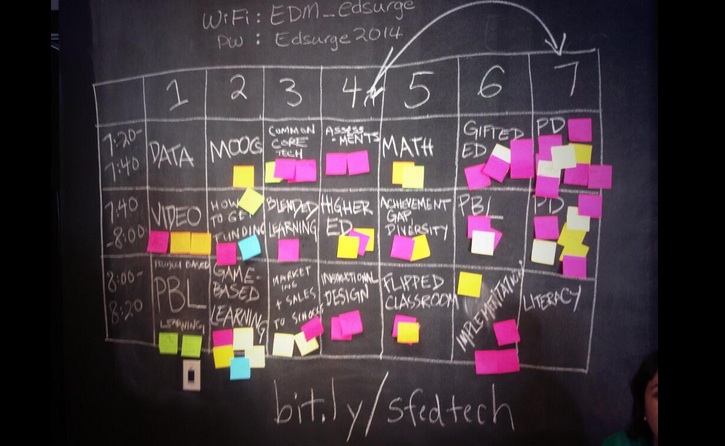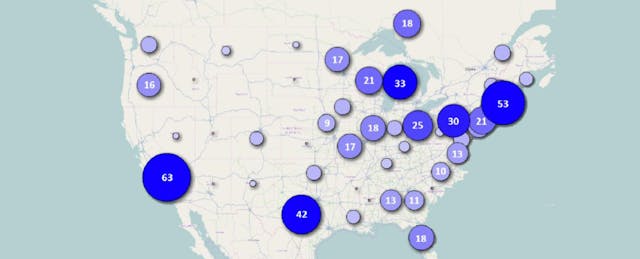To describe Edcamps as mere “unconferences” or the Edcamp Foundation as a “nonprofit” doesn’t necessarily do these terms justice. Edcamps--one-day “unconference” sessions that bring together teachers, tech experts, entrepreneurs, and anyone else interested in the education landscape--have become a viral movement since the very first Edcamp back in May 2010.
As far as the numbers go, by the end of 2014, there will have been 631 Edcamps in 15 countries. (See photo above.) What’s more striking about this growth is that it’s been sustained by volunteers, sponsors and virtually no operating budget.
That is--until now. NewSchools Venture Seed Fund has invested $100,000 in seed funding to the Edcamp Foundation, a nonprofit now based in Philadelphia.
Some say money changes things. And with a newly appointed Executive Director--Hadley Ferguson, a teacher of 32 years (14 years of which were in Philadelphia), what’s next in store for a movement that’s unaccustomed to structure and organization?
Preserving the Edcamp model
Ferguson has been with Edcamp since its beginning. “I remember back [in 2010] that this group of teachers went to Bar Camp in Philly. I heard about this idea for an education-type camp on Twitter, and wanted to chime in,” she says.
For Ferguson, the majority of Edcamp’s appeal comes from a model that focuses on personalizing professional development for the individual. “Anytime you're in a sit-and-get mode, a part of your brain turns off,” Ferguson shares, “whereas if you're in a conversation, it ignites your intelligence, and you begin to really start connecting.”
The same goes for entrepreneurs who attend these events. Ferguson explains that as long as entrepreneurs don’t come in planning to market their product, which can take away from these discussions, they can attend to learn about what teachers want. “I think that cross-pollination is incredible. There’s a place for that at Edcamps, to have those conversations and learn,” she says.
Edcamps function exactly as just that--a conversation starter, where volunteer facilitators crowdsource ideas for discussion from the attendees, and organize them onto a schedule for the day, as shown below.

Hosted by volunteers, all Edcamps are completely free, and often have very low cost margins, given that many take place in donated venues or schools.
But with money comes great responsibility, and Ferguson is quick to note that while this funding will help jumpstart new initiatives, her and the other Edcamp founders realize that the core mission and model will remain the same.
“If I do nothing for the next 3-4 months, Edcamp would still go on. It's going to continue to get viral, and attract teachers,” she says.
Ferguson has four key goals for her position: organizer support, data-tracking, community building, and more fundraising.
Goal 1: I Get By With a Little Help From My Organizers
The average Edcamp has eight to 10 organizers, and if you multiply that by the more than 600 Edcamps around the world, you’ve got several thousand volunteer organizers operating in their own individual communities--without any central feedback mechanism. Ferguson’s first goal is to figure out the best ways to support them, as they see fit.
“My first goal is to reach out to the organizers and have them say back to me, ‘What are the strengths of their Edcamp, and what are the challenges?’” Ferguson says.
Ferguson and her fellow Edcamp Foundation colleagues want to see some ways that they can support the organizers on regional and national levels. She explains: “It's important to me that this isn't top down, that it doesn't destroy what Edcamp is. It’s always been a grassroots organization.”
Goal 2: All About That Data
Currently, Edcamp does not conduct data collection, and while all Edcamps are listed on a Wikispace page, each Edcamp operates independently--meaning there is no unified method for attendee tracking. But this will change.
In connection with supporting the organizers, Ferguson believes the movement can benefit from getting more data from Edcamps across the world, from the number of people attending and re-attending to “soft, anecdotal” data such as what challenges attendees discuss.
“I want to really track from the moment someone signs up for an Edcamp to the moment they go back into their classroom, and six to twelve months after that,” Ferguson shares.
Goal 3: Helping to Maintain the Online Community
There’s also the question of maintaining a community after an Edcamp has ended. What if attendees want to get in touch with one another? What happens to the great notes or suggestions that come out of the sessions?
Sometimes, those nuggets of wisdom are posted on individual Edcamp websites. But currently, all that exists on the spartan Edcamp Foundation website is a blog and a guide for how to run an Edcamp.
Ferguson is seeking to create a website, with stable content collected at each Edcamp and curated by the Foundation. Ferguson hopes this website will also help foster a digital community, where past attendees can access notes and see what’s coming out of other Edcamps across the world.
Additionally, this website may provide a place to facilitate more online “Edcamps,” of which Ferguson reports there have already been two. Currently, MIT has developed and continues to iterate an online tool that's modeled after Google hangout, but allows people to switch into rooms for small-group discussions (essentially a hangout-within-a-hangout). It’s called Unhangout, and it’s an open-source platform that could support many more online unconferences like Edcamps.
Goal 4: A Little Bit of Money Won’t Hurt Nobody
And the last goal? “Fundraising!” Ferguson laughs. Ferguson sees other potential for funding, such as marketing to spread the message outside of social media.
“There are 14,500 schools in the States; if you are not digitally connected yourself, you won't know that Edcamp exists,” she believes. “There are no Edcamps running ads in their local newspapers; that’s a part of the world that we could open up by beginning to get some PR money.”
At the end of the day, Ferguson reminds that no amount of money can replace the work of passionate educators and the work that volunteers did to get Edcamp off the ground and spreading like a PD-stoked wildfire. And while she’s excited about where this new funding will take Edcamp, she’s humble about her role.
“Edcamp is really just teachers who care so much about what they do, and teachers with questions, who aren't afraid to say ‘Can we talk about this?’” Ferguson says. “That's the power of it--people feel connected.”


